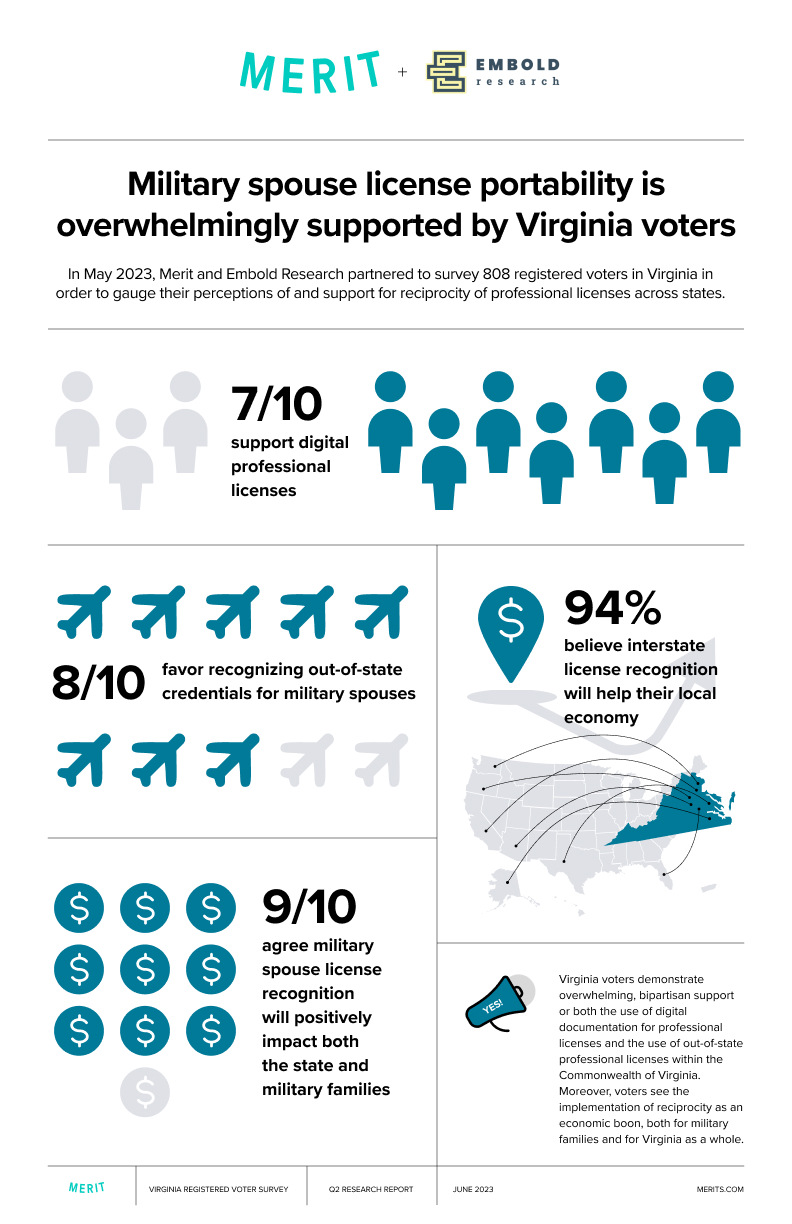ASPIRE: Alliance for States Providing Interoperable Reciprocity
A national coalition advocating for professional licensing reciprocity and mutual recognition for military spouses and veterans

Why does the ASPIRE coalition exist?
The ASPIRE coalition, made up of organizations dedicated to supporting military families, advocates for professional licensing reciprocity and mutual recognition for military spouses and veterans. Delays in transferring licenses have huge consequences for military families, but by using technology solutions that exist today, we can move passed legislation forward. This problem can easily be solved by working together—combining licensing portability legislation with a digital platform for interoperable, verified credentials, resulting in:
Less lost income Less financial insecurity More military families staying together
Proud Members of the ASPIRE Coalition
Made up of organizations dedicated to supporting military families and the initiative’s success, the coalition is fighting for states’ adoption of a digital solution for military families with portable digital licenses and credentials that transfer states when they do.








ASPIRE Coalition Launch Event
Learn why leading military family organizations and Merit have created a national coalition advocating for professional licensing reciprocity for military spouses and veterans.
Military spouses and veterans deserve easier professional licensing
34 states have passed licensing reciprocity legislation for military families, but few states have taken any steps to make the process easier for the military spouses and veterans who need to transfer their licenses. The ASPIRE coalition aims to change that.
14.5%
of military spouses move across state lines every year (compared to 1.1% for civilian spouses)*
33%
of military spouses hold a state-issued license for work*
83%
of military spouses report issues with licensing
1 in 3
credentialed military spouses gave up their license after a move**
83%
of voters surveyed nationwide support licensing reciprocity rules for military families***
14.5%
of military spouses move across state lines every year (compared to 1.1% for civilian spouses)*
33%
of military spouses hold a state-issued license for work*
83%
of military spouses report issues with licensing
1 in 3
credentialed military spouses gave up their license after a move**
83%
of voters surveyed nationwide support licensing reciprocity rules for military families***
* Department of Defense data, 2021
** Military Family Advisory Network, 2019
*** Embold Research survey commissioned by Merit, 2022
In the first six years of my marriage, I moved interstate four different times. The pain of taking and passing four different bar exams…was nearly impossible, I eventually gave up the profession I spent seven years studying.
Laura Schmiegel
Co-founder of Blue Star Families
How licensing reciprocity and mutual recognition should work
ENROLL
As part of their transfer process, licensed family members would be enrolled in a reciprocity application.
GUIDANCE
License holders would view the requirements they must meet to transfer their license, along with the required documentation.
DOCUMENTATION
License holders would use the application to submit any required documentation.
VERIFICATION
License holders could view progress as their documentation is verified.
DIGITAL LICENSES
Once the required documentation is complete and verified, the military spouse or veteran would receive a digital license.
EMPLOYMENT
The license holder can securely share their license with potential employers via a digital wallet.
MEASUREMENT
State decision makers can understand the flow of military families in licensed professions.
Join the coalition
If you are a government organization or NGO supporting military families, we invite you to join the coalition.

New Study Shows 80% of State Voters Want Military Spouse License Portability
In May 2023, Merit and Embold Research partnered to survey 808 registered voters in Virginia in order to gauge their perceptions of and support for reciprocity of professional licenses across states.
These results are in line with findings on a national level as well, where a study revealed that 93% agree that “It is hard to find a new job when you move frequently; we need to make it easier for military spouses to find new work.”

